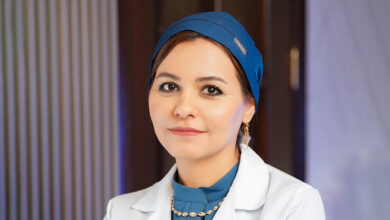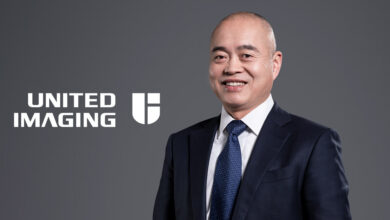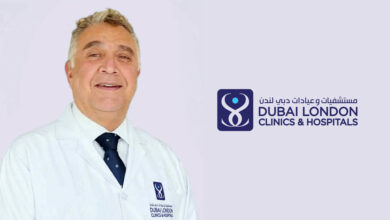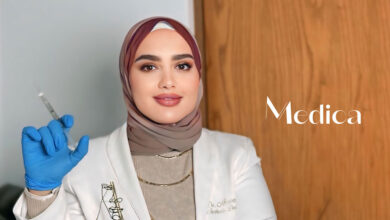Pioneering Emirati Oncologist Prof. Humaid Al Shamsi Joins Harvard and Dana-Farber
Marking a Defining Moment for the UAE’s Medical Advancement

In a historic milestone that underscores the rapid advancement of the medical and scientific sectors in the United Arab Emirates, Professor Humaid Bin Harmel Al Shamsi has achieved prestigious international recognition by being appointed a Visiting Professor at the renowned Harvard Medical School, and a Visiting Scientist at Dana-Farber Cancer Institute in Boston. On this occasion, ‘Hospitals’ Magazine had the honor of conducting an in-depth interview with Professor Al Shamsi to explore the significance of this achievement and how he envisions leveraging it to enhance scientific research and healthcare in the UAE.
Could you tell us more about this opportunity and what responsibilities it entails?
This is the kind of opportunity that comes only once in a lifetime for a physician. It is the culmination of decades of dedication and hard work in the field of oncology. Being named a Visiting Professor at Harvard Medical School, ranked the top medical school globally, and a Visiting Scientist at Dana-Farber signifies my integration into the academic and research fabric of two of the world’s most respected medical institutions. My responsibilities include participating in strategic research committees that shape the future of cancer care, particularly for patients in the Gulf region. I will also collaborate with global leaders in the fields of immunotherapy and genetic research, contribute to scientific discussions, and review clinical studies. Beyond the formal responsibilities, I also carry an unwritten duty: representing the UAE and voicing the needs of our region on the global scientific stage.

How were you nominated or selected for these prestigious roles?
My nomination came after a long and rigorous academic and professional journey. It was not accidental, but rather built on a solid body of research, over 160 peer-reviewed studies published in leading journals such as JAMA and The Lancet. These works addressed previously overlooked topics in our region, including early-onset cancer, genetic diversity in oncology, and the unique healthcare challenges in the Middle East. In parallel, I led several national initiatives, including the establishment of the UAE’s first integrated pediatric bone marrow transplant unit, the creation of a national fellowship program in hematology and oncology, and oversight of the largest cancer treatment network in the UAE.
My consistent presence at international conferences and the academic partnerships I’ve cultivated with institutions in North America and Europe also played a role. As a result, I became the first Emirati and GCC physician appointed as a Visiting Professor at Harvard and a Visiting Scientist at Dana-Farber. This honor comes with the responsibility to turn personal success into collective progress for students, researchers, and patients across the Arab world.
What goals do you hope to achieve during your time at Harvard and Dana-Farber?
My primary aim is to transform this personal milestone into a platform for knowledge transfer. My goals include:
- Contributing to research on early-onset cancer in young adults, particularly given the abnormal incidence rates in our region.
- Building a long-term research collaboration between Harvard, Dana-Farber, and medical institutions in the UAE.
- Creating formal pathways for Emirati doctors to join fellowship and advanced training programs at these institutions.
- Studying the genetic and environmental factors influencing treatment responses in our population, and developing personalized care solutions.
How do you envision this experience enriching your clinical practice and future research?
My time at Dana-Farber will deeply enrich my medical practice and research through exposure to a cutting-edge scientific environment that integrates clinical data, genetic insights, and digital modeling to create precision-targeted therapies. It will reshape my approach to care and equip me with advanced tools, both practical and intellectual, that I can bring back to the UAE. I also plan to expand genetic screening as a predictive tool, contribute to the establishment of a national cancer research center, and embed innovation into everyday clinical practice. The goal is to develop a UAE-based model of precision medicine and integrated cancer care.

As one of the pioneers of oncology in the UAE, what key initiatives have you led?
I’ve had the privilege of leading several impactful initiatives, including:
- Establishing the UAE’s first national bone marrow transplant program, offering treatments previously only available abroad.
- Launching the country’s first national fellowship in hematology and oncology, designed to train physicians to international standards.
- Developing the largest cancer treatment network in the UAE through Burjeel Cancer Institute, with nationwide reach.
- Securing the first European accreditation for cancer care in the UAE from the European Society for Medical Oncology (ESMO).
- Leading the first comprehensive cancer research project in the Arab world through co-authoring the book Cancer in the Arab World, which has become a key reference.
- Spearheading awareness campaigns and promoting early detection through social media platforms.
- Representing the UAE on prestigious international panels, including the Global Lung Cancer Policy Network, and now, as a Visiting Professor at Harvard.
How have you contributed to building local capacity in oncology?
My contribution to capacity-building has taken several forms:
- Hands-on training and clinical supervision of medical students and residents, emphasizing both practical skills and compassionate care.
- Co-founding the UAE’s first nationally accredited fellowship program in oncology and hematology, tailored to local healthcare needs while adhering to global standards.
- Fostering academic and research culture through teaching roles, organizing monthly research forums, and encouraging medical students to engage in evidence-based inquiry.
- Creating bridges with world-leading institutions in North America and Europe, opening opportunities for knowledge exchange and international training.
- Empowering the next generation of Emirati physicians through mentorship, inspiring them to lead and innovate in oncology.
What critical advancements are needed to improve cancer care in the UAE?
Key priorities for the future include:
- Integrating AI into diagnostic imaging to enhance accuracy, speed, and reduce physician workload.
- Making genetic testing a routine part of personalized treatment planning.
- Developing a national cancer outcomes registry to track recovery, relapse, and complications post-treatment, which is vital for data-driven decisions.
- Localizing the production and application of advanced cellular therapies such as CAR-T, including workforce training and lab infrastructure.

Have you participated in public awareness campaigns? What has been their impact?
Public education is a cornerstone of my professional mission. I have led and overseen several national campaigns, some of which entered the Guinness World Records. Among the most notable:
The “Pink October” breast cancer awareness campaign, featuring free screenings and educational events.
The “Check Early” initiative to promote early screening for various cancers.
We achieved two Guinness records, the most awareness ribbons made in one hour (2,828 ribbons) and the largest cancer awareness ribbon in the world. These efforts significantly boosted early screening rates, normalized conversations around cancer, and fostered a strong culture of community engagement and volunteerism.

How do you plan to leverage your current experience to improve cancer treatment in the UAE?
My experience at Harvard and Dana-Farber is a once-in-a-lifetime opportunity to immerse myself in one of the most advanced clinical and research environments globally.
More importantly, it’s a chance to transform this academic honor into a catalyst for systemic progress in the UAE.
My five-part strategy includes:
- Adapting Dana-Farber’s advanced care models for implementation in the UAE.
- Establishing a national cancer research center with international partnerships.
- Training healthcare providers in the latest treatment protocols.
- Accelerating the integration of precision medicine into routine care.
- Developing a sustainable academic collaboration framework between Harvard and UAE institutions to ensure continuity in training and knowledge exchange.
What are the major global challenges facing cancer care today?
The key challenges include:
- The disparity in access to treatment between developed and developing nations.
- The escalating costs of novel therapies, which are often unsustainable for healthcare systems.
- The lack of comprehensive data from regions like the Middle East and Africa.
- Patients’ reluctance to seek treatment.
- Misinformation about cancer and its treatments on social media platforms.
- What is your message to young doctors and researchers?
Drawing from more than two decades of experience, my message is simple yet profound. Create your own opportunities through perseverance and initiative. Let the patient always be your compass, the essence of medicine lies in humanity. Never stop learning. Failure is the prelude to success. Choose your mentors wisely, but be original. Define your mission before your résumé. Dare to dream boldly. Our future lies in your hands.
How can the UAE lead cancer research in the region and beyond?
The UAE has the potential to become a regional and even global hub for cancer research, particularly in clinical trials and precision medicine.
This is made possible by unparalleled government support for long-term research funding, state-of-the-art infrastructure, and a highly diverse population that enables the study of genetic variability. Strengthening international partnerships and training national researchers are also essential. These steps have already begun through fellowship programs and clinical research units. We are working toward building a national oncology database and a regional innovation platform. The UAE is not just catching up, it’s ready to lead.
What achievement are you most proud of?
Of all my accomplishments, I am most proud of establishing the UAE’s first comprehensive bone marrow transplant program for children and adults. We’ve completed over 180 successful transplants with a 98% success rate, one of the highest in the world. This initiative emerged as a national imperative during the COVID-19 pandemic, when overseas travel for treatment was no longer an option. We developed a world-class unit, trained Emirati medical teams, implemented cutting-edge protocols, and built a post-transplant care network. This is not just a statistic, it’s a beacon of hope for patients and their families, and a living embodiment of the UAE’s leadership vision that places human dignity above all.
What are your aspirations for the future?
Despite my academic and professional milestones, my greatest dream is rooted in humanity, to establish a fully integrated, charitable cancer center in an African nation, where treatment is entirely free. This isn’t about expanding my career. It’s about my core belief that healthcare is a fundamental right, not a privilege, and that dignity should never depend on one’s ability to pay.

Why Africa?
Because Africa faces a growing cancer crisis, with limited early detection and treatment options. Many patients are diagnosed too late, or not at all. Children, women, and men are dying in silence, their stories untold simply because they were born far from opportunity.
How do you plan to make this dream a reality?
Although building a charitable cancer center in Africa is a monumental task, I am determined to make it happen.
I’m forging partnerships with public and private entities both locally and globally, developing a sustainable funding model based on donations and grants, and engaging African ministries of health to secure logistical support and land. I also aim to rally the Arab and global medical communities to volunteer their expertise for this humanitarian mission.
Why this dream, above all?
Because medicine, at its core, is a calling, not just a career. True success is not measured by awards or titles, but by the lives we save without expecting anything in return.
I believe that when the intent is genuine, God opens doors. And this project is one I approach not as a professor or an executive, but as a physician, with an open heart.















